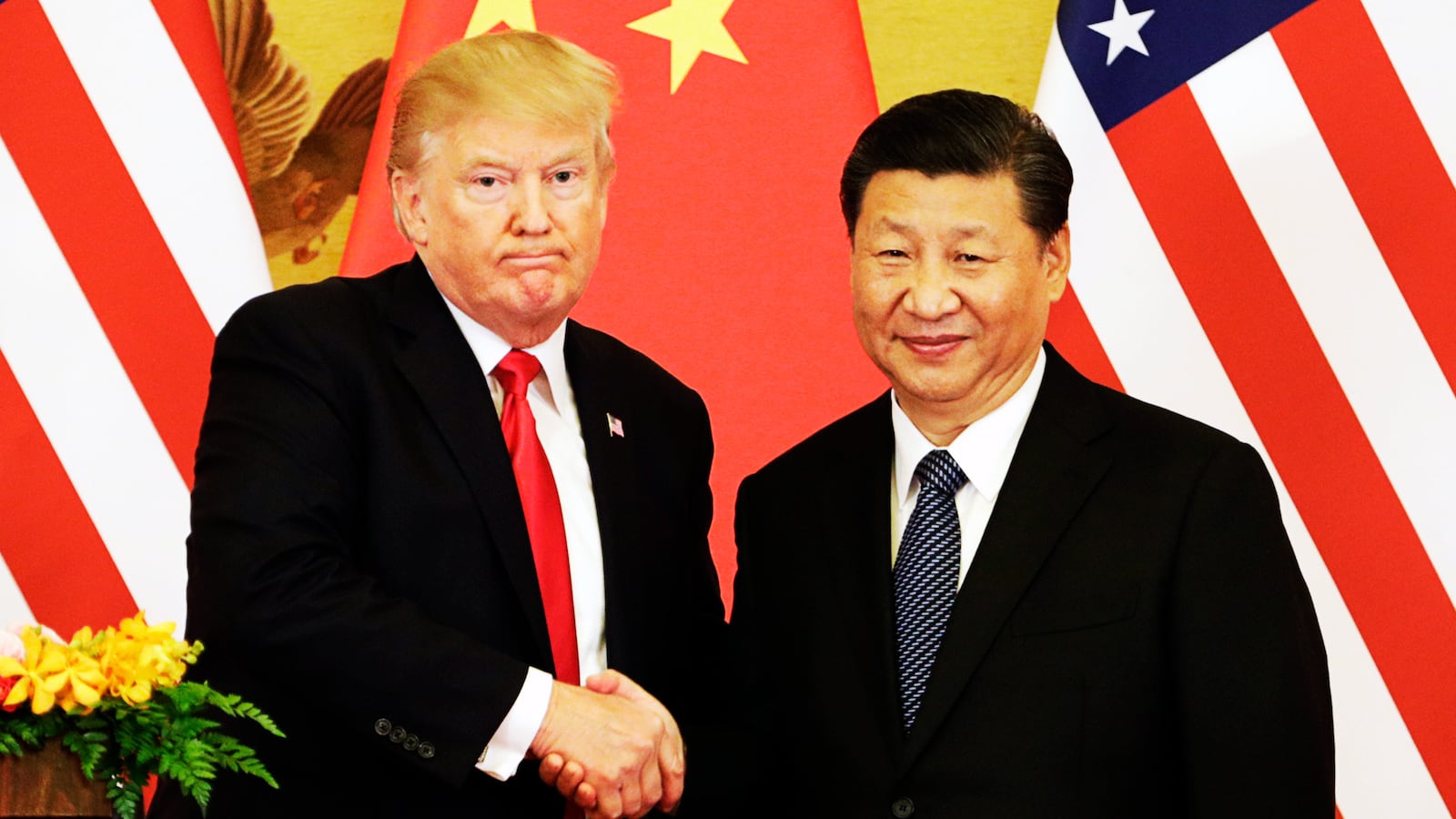’Tis the season for hostile Chinese military officers to publicly urge attacks on the U.S. Navy.
Twice this month, a senior Chinese officer has done so. On the 20th, Rear Admiral Luo Yuan, before an audience in the southern Chinese city of Shenzhen, said he could use Dong Feng-21D and Dong Feng-26 missiles to sink two aircraft carriers and kill 10,000 Americans.
In the weeks before the 40th anniversary of America’s recognition of the People’s Republic on Jan. 1, China’s military has gone on a rhetorical bender.
And that leads to one stark conclusion: “Our greatest foreign policy failure.” That’s how historian Arthur Waldron of the University of Pennsylvania, in comments to The Daily Beast, described America’s post-1978 policy toward the People’s Republic of China.
In more than two centuries of Washington’s mistakes, blunders, and debacles, one in particular—its China policy—now stands out.
For Americans, the 40th anniversary of diplomatic ties should be a time to acknowledge mistakes and end decades-old self-delusion.
Let’s start with the delusion. “Past U.S. policy toward China fundamentally underestimated the hostility, ruthlessness, and will to power of the Chinese Communist Party,” Scott Harold of RAND’s Center for Asia Pacific Policy told me last week.
Americans for more than a century have been over-optimistic about China, but their failure to comprehend the Soviet Union compounded the inability to understand the current Chinese regime. Instead of recognizing the inherently belligerent nature of communism, American policymakers thought Moscow was just another state and believed rocky relations had to be their own fault. “The West,” Waldron wrote on the Fanell Red Star Rising listserve last week, “went to great lengths to rationalize and normalize” the Soviet system.
Americans then took the incorrect conclusions on Soviet communism and applied them to China. As a result, many Washington policymakers thought the U.S. was responsible for Mao Zedong’s hostility and that the situation would improve when they stopped frustrating the Chinese leader. As Winston Lord, Kissinger’s deputy in the 1970s, told Waldron last decade, America’s relations with China had to be based on “necessary myths.”
Building relations on a foundation of myths had consequences. “We are now not where we thought we would be 40 years ago when U.S.-China relations were normalized,” RAND’s Harold told me. “China spent the first 10 years raising American hopes that it might liberalize, open up its economy, and democratize, and the last 30 years dashing those hopes.”
In one sense, American expectations were met, but not on the “Mainland,” as some people call it. “Taiwan is now the liberal, democratic partner that some Americans thought, and all Americans hoped, China would one day become,” the RAND scholar says.
And as Gerrit van der Wees, a Taiwan analyst associated with the Global Taiwan Institute, points out to The Daily Beast, it was the democratization of the early 1990s in Taiwan that permitted strong links to develop between the island republic and Washington even though America withdrew diplomatic recognition. “The unofficial ties between the U.S. and Taiwan are now on a much more solid basis,” he says.
Americans spent decades trying to convince themselves that the form of the Chinese government did not matter. Yet it most definitely did. Xi Jinping, the current ruler, is now even recycling imperial-era views that the Chinese emperor ruled tianxia, “all under heaven,” thereby suggesting China should now be considered the world’s only sovereign state.
The bold Xi, who is in no position to compel acceptance of this audacious and ludicrous position, nonetheless is trying to implement it. When Xi this month in a major speech declared, “No one is in a position to dictate to the Chinese people what should or should not be done,” what he was really saying was that no treaty, convention, agreement, or norm binds his magnificent state. In short, he has given us an especially disturbing context to understand his challenge to the international system. The Chinese regime is again fueled by a revolutionary idea.
This notion of tianxia now explains much of China’s challenge to the U.S. military. This year, Beijing went beyond threats to action. In the first week of May, the U.S. Defense Department stated that China, from its only overseas base, in Djibouti, lasered a C-130, a cargo plane, causing eye injuries to two American pilots.
China has been continually attacking U.S. planes with lasers over the South China Sea and East China Sea, which lap up onto Chinese shores. The laser attack in the Horn of Africa, far from any of Beijing’s current territorial claims, underlines Beijing’s unstated position that the U.S. military has no right to operate anywhere. And because an attempt to blind pilots is akin to an attempt to bring down their planes, China is effectively asserting it has the right to kill Americans.
Are Americans, as James Curran maintains, “beginning to face up to the collapse of the core assumptions shaping its approach to China”? Perhaps, but Washington policymakers have yet to fully think through what they must do to protect the U.S. from an exceedingly dangerous China.
And that brings us back to Rear Admiral Luo. American trade and investment has enriched China, and it is the enrichment of China that has allowed Beijing to build a fearsome military that Luo and others are using to threaten America. Until Luo and his colleagues accept international norms—and that has not happened despite four decades of “engagement”—the U.S. should disengage its economy from China’s.
And while Americans disengage from those who wish them harm, Washington should build stronger relations with those, such as the Taiwanese, who wish them well.
American policymakers have yet to learn from Mao Zedong. “Who are our enemies?” he asked in the 1920s. “Who are our friends?”
Almost a hundred years later, Americans have not brought themselves to ask—much less answer—those two critical questions.






